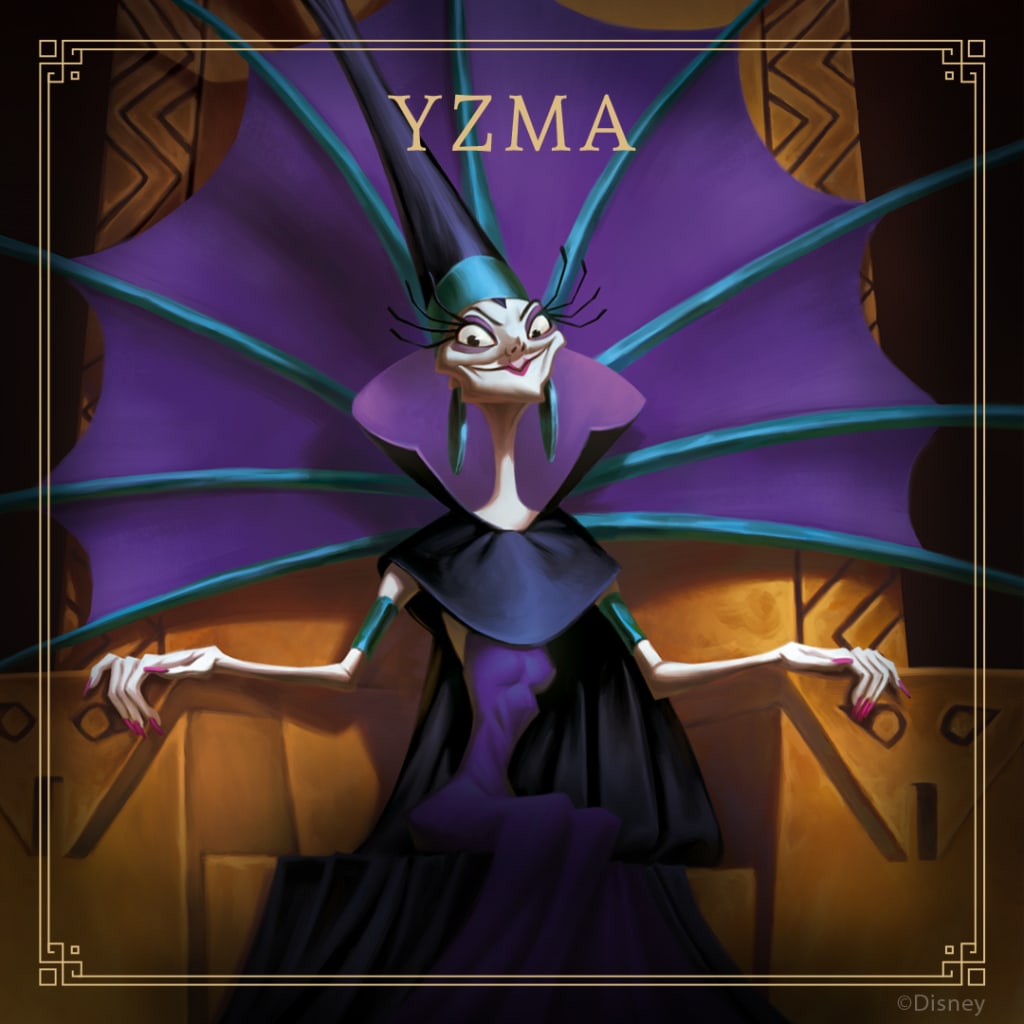Disney and its Villainess
Yzma and Disney's tropes.

A couple of months ago, I watched “The Emperor’s New Groove”, a film that I used to love when I was a child. It struck me how I could catch new aspects, never seen before, cleverly hidden by Disney, in Yzma’s character. Therefore, I decided to write down some thoughts about this villainess.
To start with, one of the things that I found interesting was that, in the Italian version (which is the one I used to watch), Yzma is called “the ugly mother of Dracula”, while in the original she is said to be “scary beyond all reason”. Even though this is determined by the dubbing more than by Disney itself, I found it ironic. This small thing already says a lot about biases and what two different cultures consider an evil trait to be. Even if we could justify some dubbing solutions being motivated by the characters’ lips movements, which dictate the more suitable words, nonetheless it appears to me that being ugly is an evil trait.
This is not ground-breaking news: after all, witches have always been depicted as ugly and nasty. What is curious, though, is the degradation through beauty. After all, what is always been asked of women is to be attractive, beautiful, and quiet. I found it interesting how, in the original version, Yzma is said to be scary rather than ugly. It made me think how, in history, beauty was tied to virtue and, specifically for women rather than men, pretty was tangled with not scary. It is an ancient trope: scary women are unsettling for men. After all, a witch is a woman who is not tamed and whose negative emotions are visible, exposed to the light, and not concealed. That seems to be the main problem: a woman who is no longer calm and positive but shows anger, distress, and, above all, strength. That is the main issue with witches: they are powerful through their anger. As it has been said by many feminists before me, anger is liberating. Women need to get their anger back; they need to appropriate their right to be angry again. It is their outrage that makes them mighty and, possibly, invincible. We know well enough, though, that witches, as dragons, are meant to be defeated. For the patriarchy, an angry woman is scary. As Sheldon Cashdan named his book, the witch must die in the end. Even though I love fairy tales, this fact makes me question the necessary happy endings of all stories: do they mean that “good wins” or that “whatever is ugly and scary in us needs to be suppressed”? After all, it was Nietzsche who said that, if you stare into the abyss, the abyss will stare back at you.
However, back to Yzma. It stayed in a corner of my mind, over the years, unconsciously from childhood to adulthood, how Yzma as a villain was unfair. After all, she is an old woman, who has been fired after years of work and commitment to a selfish boy who is entitled to become emperor. For Disney’s magical capitalism and patriarchal soft power, though, this is a fair punishment: a woman without kids, who had the terrible idea to dedicate her life to her job. That is what is unforgivable: a woman who decided not to have a family and focused on her career (even though she says that she basically raised Kuzco, who appears not to have parents).
Moreover, Yzma is a woman who aged. As the myth of the woman is built on virginity and motherhood, the last part of a woman’s life is often disguised. This is because an old woman is not fertile and this means, to society, that she is unattractive. Moreover, she has lost her purpose.
There is this scene, in the film, where Yzma pulls up her dress and shows her leg: Kuzco and Pacha, after complaining because they don’t want to see her “nudity”, are relieved to find out that she meant to show them a dagger (to kill Kuzco) and not her private parts. For how comical this scene was meant to be, it is also highly problematic: it wants to represent the disgust in front of a woman who is old, not fertile, and not sexual. Yzma is the direct opposite of Pacha’s wife, who is pretty, pregnant, and whose anger is directed into something else and therefore controlled (by coincidence: into washing the dishes). And then, how does Yzma end? By being transformed into a cat — a little, cute animal, whose voice is very high-pitched. She is finally tamed.
For myself, I stand with the evil witch: Yzma does not take her anger out on another woman, who then becomes the enemy in a scheme that patriarchy has always loved to watch; she goes against the man that put her down and degraded her. This is the reason why she becomes evil. She is depicted as trying to steal his job (which, well, is given by inheritance, because the guy is an emperor), meaning that she is trying to go up the ladder, after eighteen years of hard work. She is the woman that is tired of asking for permission and believes to deserve more (something that patriarchy doesn’t love either: it works for men, not for women). Here is another point: women shouldn’t try to defy the social system. The guy is an emperor, she should accept that she cannot be anything more than his assistant and, at some point, she will be disposable.
I like Yzma and her anger. She is comical, yes, but she also represents many things that have been hidden behind her character, in an attempt to make these traits seem wicked. To some extent, she is a proper witch: not magical but not powerless. She gives orders, she owes a laboratory (another thing: she is a scientist, something that society has tried for a long time to be men’s domain only), she has got a kind of toy boy (Kronk), and is constantly angry about the status of things. I think that Disney, without meaning to, gave us one of the best witches after Maleficent. And I root for her. She is not a feminist, but she represents a myriad of things we feminists fight for.
[Through this analysis, I don’t mean to look for problematic readings of films that shaped my childhood at all costs; I am also not on a crusade against Disney. I used to love that film and it still represents a childhood memory. What is worrying, in my opinion, is Disney’s soft power and its ability to perpetuate patriarchal stereotypes in a pleasant way.
I just aim to observe the stories that helped to shape part of my life from a different perspective. After all, we are made by stories, and I believe it is our duty to question, in good and bad, the ideas that they are meant to convey.]
About the Creator
Francesca Paoletti
I am an Italian Londoner, which means to me that my identity is made of two halves. As a philosophy graduate, I enjoy writing about society, culture and everything within it with a philosophical mindset. In love with storytelling.






Comments
There are no comments for this story
Be the first to respond and start the conversation.